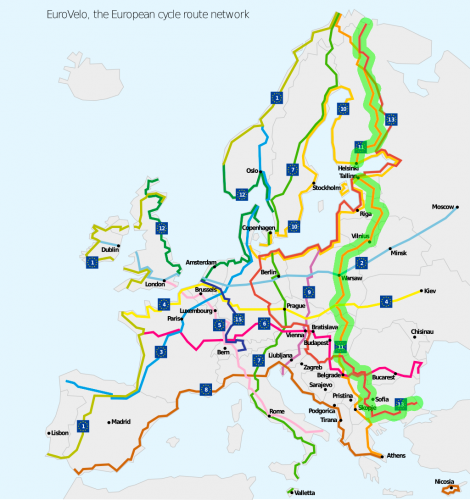Close the loop
Since the beginning of this project my target had been to reach Russia. I’m relaxed about the sailing, eating, sleeping, and people - that will be fine. But borders and visas unsettle me more. The required authorizations are time consuming and sometimes costly to attain. And still uncertainties remain. They impinge upon appreciation of the day to day, like clouds that won’t clear.
And, parallel to the official target, there had always been a privately held daydream to close the loop. To – someday, somehow - arrive at where I had departed from: converting this wandering into a circumnavigation of sorts. Would that be possible?
Well, kind of. Miles Clark and his father Wallace Clark – sailing the family ketch Wild Goose – between them achieved a circumnavigation of Europe. Miles began the journey in Ireland. He solo-sailed to the Arctic, before linking Barents Sea to Black Sea with a route through the White Sea and via rivers including the Volga and the Don. Wild Goose overwintered in the Aegean, and Miles returned home to begin writing up his logbooks. Tragically, perhaps suffering fatigue and writer’s block, Miles ended his life prematurely. Later, Wallace would eventually complete both his son's voyage, and the book that describes it.
I studied the above potential route and others. An interesting alternative looked to be by following Ukraine’s Dnieper river then other waterways to the Baltic, from where the White Sea could be reached. But - ultimately - the hours on Google Maps and Wikipedia failed to inspire a practically realistic plan: the distance would be too far to sail and paddle in one summer season, and the inevitable Russian winter too bleak. This, and the realisation that I don’t have an appetite for the administrative obstacles, allowed the idea to founder.
Relieved of the burden of requiring a maritime/waterway route, other options could be considered. I happened upon the EuroVelo 13 ‘Iron Curtain’ bicycle route, that extends to the coastal border of Norway and Russia: to the exact same location I started sailing in May 2017! An Excel sheet later and a new plan was born.
Updated plan
- Resume sailing in March 2019 as planned: Bosphorus, Turkish Black Sea coast, Georgia.
- If border issue does not become a delay-ridden headache, continue into the Republic of Abkhazia, and ideally reach the border with Russia.
Return to EU by ferry service from Georgia to Bulgaria (kind of a cheat, but limited alternative options due to visa considerations).UPDATE: See Updated Plan: Revised- Change windsurf gear for bike gear.
- Follow EuroVelo cycle network to north Norway (estimate preference to be cycling by end of May).
- The EV13 finishes on the border of Norway and Russia at the same place I started sailing, so concludes the journey (autumn arrival at latest to avoid winter conditions).
[ 23/03/2023 This post was amended with more accurate details about Miles and Wallace Clark, and their round Europe voyage. ]
Russian Help
When ponder the options I revisited my motivations. I’d wanted to sail into Russia to reach out and make a human connection across borders - to highlight the basic similarities between us all, and underline how we are all in the same boat from an environmental perspective. Planetary problems require a coordinated response, so we better start seeing our neighbours as our partners pretty damn soon! There is no coincidence that this theme developed at the time of the Brexit vote.
By looking into the Russia finish I did reach out across borders, and I am happy to report that the enthusiasm and willingness to help of the Russian people has been just as forthcoming as it has been with people from elsewhere. Particular thank yous to Tatyana, Dmitrii, Yulia, and Vladimirs various: your contributions have been significant, inspiring and - for the story of the journey - necessary.


